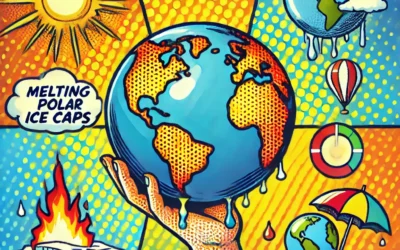Climate Warming: Understanding the Environmental Impact
In the realm of environmental concerns, climate warming stands as one of the most pressing issues of our time. With each passing year, the consequences of a warming planet become increasingly apparent, manifesting in rising temperatures, extreme weather events, and disruptions to ecosystems worldwide.
Understanding the Mechanisms of Climate Warming
Climate warming primarily stems from the release of greenhouse gases into the Earth’s atmosphere. These gases, including carbon dioxide (CO2), methane (CH4), and nitrous oxide (N2O), trap heat from the sun, creating a greenhouse effect that leads to a gradual increase in global temperatures. Human activities such as burning fossil fuels, deforestation, and industrial processes significantly contribute to the accumulation of these gases in the atmosphere.
The Role of Carbon Dioxide Emissions
Among greenhouse gases, carbon dioxide emissions play a predominant role in climate. The combustion of fossil fuels for energy production, transportation, and industrial activities releases vast amounts of CO2 into the atmosphere. Deforestation, primarily driven by agricultural expansion and urbanization, further exacerbates the issue by reducing the Earth’s capacity to absorb CO2 through photosynthesis.
Impacts of Climate Warming on the Environment
The effects of climate warming are wide-ranging and profound, posing significant challenges to both natural ecosystems and human societies.
Rising Global Temperatures
One of the most evident consequences of climate warming is the rise in global temperatures. Over the past century, the Earth’s average temperature has increased steadily, with the last few decades witnessing accelerated warming trends. This rise in temperature contributes to the melting of polar ice caps and glaciers, leading to sea-level rise and disruptions to marine ecosystems.
Increased Frequency of Extreme Weather Events
Climate warming also amplifies the frequency and intensity of extreme weather events such as hurricanes, heat waves, droughts, and heavy rainfall. These events not only pose immediate risks to human life and infrastructure but also have long-term implications for agricultural productivity, water resources, and biodiversity.
Disruption of Ecosystems and Biodiversity Loss
Ecosystems around the world are facing unprecedented challenges due to climate warming. Shifts in temperature and precipitation patterns alter habitats, forcing species to adapt, migrate, or face extinction. Coral reefs, for example, are highly vulnerable to temperature increases, leading to widespread bleaching events and ecosystem collapse. Additionally, disruptions in food chains and loss of habitat threaten the delicate balance of biodiversity.
Mitigation and Adaptation Strategies
Addressing climate warming requires a multifaceted approach that combines mitigation efforts to reduce greenhouse gas emissions and adaptation strategies to cope with the impacts of a changing climate.
Transitioning to Renewable Energy Sources
One of the most effective ways to mitigate climate is to transition away from fossil fuels towards renewable energy sources such as solar, wind, and hydroelectric power. Investing inclean energy technologies not only reduces greenhouse gas emissions but also promotes sustainable development and energy independence.
Enhancing Carbon Sequestration
Efforts to enhance carbon sequestration can help offset climate warming by removing CO2 from the atmosphere and storing it in natural reservoirs such as forests, soils, and oceans. Reforestation projects, sustainable land management practices, and ocean fertilization techniques are among the strategies employed to enhance carbon sinks and mitigate the effects of greenhouse gas emissions.
Building Resilience and Adaptive Capacity
Adaptation measures are essential to building resilience in the face of climate. This includes implementing infrastructure improvements, developing early warning systems for extreme weather events, and promoting sustainable agricultural practices. Investing in resilient communities and ecosystems is crucial for minimizing the impacts of a changing climate and safeguarding livelihoods.
Conclusion
In conclusion, climate warming presents a formidable challenge that requires urgent and concerted action at global, national, and local levels. By understanding the mechanisms driving climate and its far-reaching impacts on the environment, we can implement effective mitigation and adaptation strategies to mitigate its effects and build a more sustainable future for generations to come. Through collective effort and commitment, we can address climate warming and safeguard the health and integrity of our planet for future generations.






